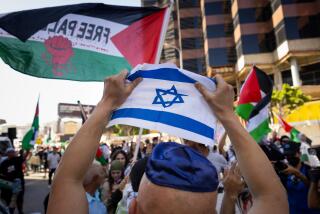Hillah Car Bomb Ignites Rage
HILLAH, Iraq â A black banner hangs near the outdoor market of this rural southern town expressing condolences for the âinnocent martyrs who were killed at the hands of the sinful traitorous terrorists during the cowardly attack.â
For many Hillah residents, the shock and sorrow of Mondayâs car bombing has shifted to anger, both at the insurgents who carried out the attack and the Iraqi security forces and government that failed to prevent it.
This morning, bombers struck again in central Baghdad. A car bomb exploded near Muthanna airport, site of an Iraqi army installation, killing at least seven people and wounding about 30, a hospital doctor said.
Eighteen people were killed in a suicide car bombing in June at the same airport.
In Hillah, college student Haidar Hadi said of Mondayâs attack: âWe want an explanation from the Hillah police. How did this car bomber manage to penetrate and reach these innocent victims?â
The area in front of the badly damaged, one-story Public Health Center was littered with debris, ash and charred car parts. Downtown shops were closed as residents sifted through the wreckage, pointing out to visitors bits of human flesh embedded in the walls of buildings.
Others gathered in groups to swap theories about how a suicide bomber could have eluded a police cordon to strike a crowd of aspiring police and army recruits who had lined up Monday morning for medical examinations.
Casualty reports from the attack remain inconsistent, with the death toll ranging from 109 to 125 and more than 100 wounded. But even the most conservative estimates make the Hillah bombing one of the bloodiest attacks since the U.S.-led invasion to oust Iraqi dictator Saddam Hussein.
Most of the dead were young men seeking the medical tests required before applying for jobs in the police and army.
Because crowds of aspiring recruits are a frequent insurgent target, it would have been logical for the authorities to provide ample security around the clinic. Residents decried the police protection as shoddy, with some charging that Iraqi civiliansâ lives were valued less than those of others.
âIf you look at different political party headquarters and police stations and the American bases, you can see how fortified they are. Compare that to how ignored the Iraqi people are,â said Thaer Talib, a 32-year-old resident of the neighboring town of Babylon. âWe, the simple citizens, who is going to protect us?â
The parliamentary election a month ago was widely regarded as a cause for optimism in Hillah and the rest of Iraqâs Shiite Muslim heartland.
Iraqi and U.S. officials hailed the election as a crucial political milestone but cautioned that it would do little in the short term to reduce the level of insurgent violence.
But promises of a gradual erosion of the insurgency through military operations, political inducement and the development of local security forces bring little comfort to some Hillah residents.
Mohammed Hadi, 25, turned red as he spoke bitterly about the Iraqi government, which he said failed to protect his city.
âWhere are the people who we elected? Let them come and see what happened,â he yelled. âThey made a great fuss during the campaign, saying, âCome and elect us, and we will do so-and-so for you.â Where are they now? Are they busy with their big salaries? Was it just promises and words? Is this the fruit of our votes?â
Although the transitional national assembly members elected Jan. 30 have yet to assume their posts, the anger on display in Hillah may indicate the high expectations and limited patience of many Iraqis now that the election is over.
Theories abounded in Hillah on Tuesday about how the bomber got through police lines in what witnesses said was a white or gray Mitsubishi sedan. Police incompetence played a role in every story.
Some people claimed to have seen the driver talk his way past a police checkpoint. Some said the bomber arrived with an elderly woman in the passenger seat and claimed that she was paralyzed and needed to be driven to the clinic door.
The most common theory, seconded by Gov. Waleed Janabi, was that the bomber drove down a back alley overlooked by police. Janabi said he believed that the bomber came up the alley after rebels removed long-standing obstacles in the path in preparation for the attack.
The clinic had been a well-known gathering spot for aspiring recruits from Hillah and neighboring towns.
âIt seems the news had reached the terrorists,â Janabi said. âI think it wasnât a good idea to gather all these people on one day.â
The governor took reports of public anger in stride, describing it as the natural frustration of people desperate for safety.
âIn such tragic circumstances, ordinary people start to express themselves, stemming from the sorrow and grief they feel after losing their friends, family members and loved ones. I donât blame them for doing that,â he said.
More to Read
Sign up for Essential California
The most important California stories and recommendations in your inbox every morning.
You may occasionally receive promotional content from the Los Angeles Times.










